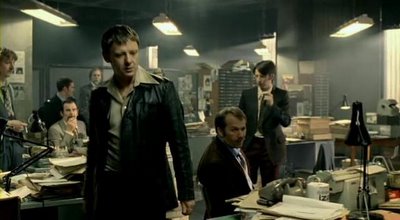David Beaver at Language Log:
The following conversation took place between my wife, Moni, and one of the chimps' owners and carers, Karon. You may or may not take it as a summary of the ongoing (never ending?) animal language debate:
Karon: Some of these chimps can sign.
Moni: Oh really! What do they say?
Karon: I don't know. I don't speak sign language.
In June, 2005, the State of Virginia Employment Agency, which handles unemployment compensation, announced that they would lay off 400 employees for lack of work, because unemployment is so low in the state.
(Or, what I ran into while thinking about a completely different posting that might turn out interesting.)
From a guy who hates those guess-what-I'm-thinking puzzles:
1. A man lives on the top floor of a tall building. Every morning he takes the lift to the ground floor to leave for work. Upon his return, however, he can only travel halfway up in the lift and has to walk the rest of the way - unless it's raining. What is the explanation for this?Lots more at the link, progressing to funnier answers. Seen from a comment on Unfogged, the ingroupiest blog I know, but still plenty of fun to read. If you don't share my distaste for these lateral-thinking puzzles, that's actually the debate hidden in that thread.Answer:
The answer is simple but deeply satisfying once you know it. Every evening when he gets home a fat lunatic gets on the lift at a middle floor, sits on him, and slaps his cheeks to the tune of Bonanza for the rest of the night. To avoid this he has to get out before the lunatic's floor and walk the rest of the way. However, he lives in that cool building off Stingray which is lowered into the ground for protection when under attack, or when it's raining. In the latter case he can simply walk onto the roof and drop down through the skylight to reach the top floor.
Brittany Cripliver. (Safe for work? Depends where you work. Somewhat lower cheesecake level than the Sports Illustrated swimsuit issue, if that helps.)
A site that recognizes songs when you tap their rhythm.
(If you think really hard, you can probably work out the brilliant bilingual pun that is, I'm sure, lurking in the post title.)
Rolling Stone:
There's one thing Hasidic reggae man Matisyahu won't do on his new U.S. tour: stage dive.And he's at #32 on Rolling Stone's album chart, so I guess some people have heard of him. But I never know anything about music nowadays."There's a law that no man and woman may touch unless they're married," says the twenty-six-year-old MC. "I was caught doing it. So I checked, and, no, can't do that anymore -- there's women touching you for sure. That, and I also I got dropped once. I took, like, six people down."
Specifically: don't call anything the Blizzard of 06 until the rest of 2006 has come and gone.

British TV has a long history of fantasy & SF programming, much of which never makes it to America -- for every Doctor Who or The Prisoner, there's a Sapphire and Steel. With modern copyright infringement techniques, this is no longer true, and the latest transatlantic contraband is Life On Mars, which is running Mondays at 9 on BBC1.
The title is allusive rather than literal; Sam Tyler (John Simms) is a detective in modern-day Manchester, where we spend about 10 minutes establishing the technological and professional sophistication of the modern British police force. (As viewers of any one of a number of Mystery imports will know, for instance, all British police interviews are videotaped, which is an innovation that if introduced in America would go a long way towards establishing the validity of disputed confessions, for a start.) Sam's current case concerns a woman found murdered after being missing for over a day; his girlfriend/co-worker (well, professionalism has its limits), after being removed from the case for unclear reasons of plot contrivance, gets kidnapped by the killer while following up, alone, her own theory of the case (well, professionalism has more limits). Here's Sam, all professional-like:

Then Sam gets hit by a car and wakes up in 1973.
Huh.
Here's Sam, all confused and wearing the stylish 1973 outfit he woke up in:

Sam finds that he has papers identifying him as a detective who has just been transferred to the 1973 version of his own squad, and here's where we get to the point: to someone from 2006, 1973 is the fricking' Stone Age. The cops are all white men, and either thuggish, dopes, or both; by contrast, Sam's 2006 co-detective was an Anglo-Indian woman. His new boss, Gene Hunt (Philip Glenister, overloaded with comical menace and guaranteed to be a fan favorite), greets him with a punch in the stomach. Granted, that's because Sam has been ranting about how this is his own squad, dammit, but it establishes the nightmare existence that Sam is entering, because he's in 1973! They only have dial phones! What's funny about this, to me, is that 1973 is the last of three years that I lived in England. It may just be from living long enough, but I've never before thought of my own early teenage years as a distant mythological time of legend, but there you have it. To Sam, though, it's "like I've landed on a different planet", thus the title.

That's Hunt welcoming Sam to his new/old office. Not too surprisingly by scriptwriting standards, the first case Sam has to solve in 1973 is a murder that's obviously been committed by the same person who's killing in 2006. This is resolved in the pilot in a fairly satisfying way, and the series settles into a mix of fish-out-of-water policing and Back-to-the-Future-ish wow-this-old-thing-is-new-here-ism, with a dangerous threat of Quantum Leap-ish meetings with celebs of the past. (Sam warns glam rock pioneer Marc Bolan, who died in a car crash in the mid-1970s, to drive carefully; at another point he mounts a TV set on metal backets in a pub and thus supposedly invents the sports bar.)
Oh, and every once in a while, Sam hears voices talking to him, or about him, along with the TV-conventional sound of a beeping medical monitor, leading him to conclude that he's probably in a coma in 2006 and having a really complicated hallucination. Probably. He's also having other weird dreams, some of which seem to be buried memories of some event having to do with forest greenery; in others, he has conversations with the little girl from this old BBC test pattern:

It's a famous image to all Britons of that time, since the BBC used it to fill the significant empty blocks in its daily schedule. Having a conversation with this child is like an American talking to the NBC peacock. Especially if the peacock walked out of the TV and into your apartment. Holding a clown doll.
So that's how the fantastic aspect sets up; presumably we're heading towards a resolution that will make sense at both levels of reality, and followers of British TV will detect whiffs of The Singing Detective and Goodnight Sweetheart. What's really interesting to me is what the creators, who are probably about Sam's age -- four years old in 1973, he says -- think about Britain of the early and mid-1970s.
First of all, there's just the sense -- conveyed, again, by the title -- of the immense distance between then and now. At first I found this surprising, since the difference between the same two years in America doesn't feel as great, but there are a couple of reasons that it makes sense here. For a start, 33 years is a long time; if we think for example about Star Trek's famous episode "The City on the Edge of Forever", 33 years is just about the time between the episode date (1967) and the Depression-era year that the characters travel back to. It's also just about the distance that Marty McFly travelled in BTTF, and that distance -- between 1985 and 1955 -- also feels like a huge jump to me.
Now, in both of those cases, it's probably relevant to my feelings about them that the jump is between a point in my life and a point before it. But going from the US to London in 1970, when moved there, did feel a little like going back in time. (So, in that case, rather than the past being a foreign country, a foreign country was the past.) A lot of things weren't as modernized as we were used to; central heating, for example, was uncommon, and the toilets in our house had pull chains. More to the point, though, was the feeling that although the Swinging Sixties had happened, the social and political changes of the (American) 1960s hadn't. Most white Britons were not aware that they had racial issues with their non-white population; there was a certain amount of casual joking anti-semitism; and, as the topper, let it be known that a program called The Black And White Minstrel Show was broadcast irregularly until 1978. Both technically and socially, modern Britain is far closer to the US now than it was then, so their 1973-2006 jump does seem bigger than ours.
More specifically, there's the question of how policing has changed. So far, we've been reminded that the following things did not exist in1973 Manchester: anonymous lineup ids from behind a one-way glass; recording of interrogations, as mentioned above; fingerprints taken from the skin of a human body; and blood type results in less than two weeks. The squad also routinely plants evidence -- only on the guilty, of course -- indulges in medium-scale financial corruption, and engages in mild suspect abuse. (The early-70s Bowie song that gives the series its title plays during Sam's accident/awakening -- from an iPod in 2006, from an 8-track player in 1973 -- and the lyric "Take a look at the lawman beating up the wrong guy" makes a serendipitous point.) All in all, it's as if CSI's Gil Grissom had dropped into an episode of Kojak.
When Britain's Prime Suspect came out, it struck me that the Brits were dealing with issues of gender in the police force that, in TV at least, had been addressed 10 years earlier in Cagney & Lacey. The 1973 cops in this show, on the other hand, treat women -- women's auxiliary police, witnesses, whoever -- with breathtaking boorishness and contempt. "Women" in this show are represented by Annie Cartwright (Liz White) of the aforementioned women's auxiliary, who fills the role of "only possible love interest" or maybe that of "we have to have a woman in this show, right? Aside from the test pattern girl." You know, now that I'm thinking harder about women in the police force, that bit about how the only woman on the 2006 force wanders off and needs rescuing is pretty lame. Here's useless Annie:

The effect of all this, finally, is to displace violent police tactics and corruption into the past, implicitly clearing today's police of such things. The years between 1973 and now include the case of the Guilford Four, who were framed as IRA terrorists in what became the generation's most notorious miscarriage of justice. How nice, then, that these terrible things are safely in the past.
What I said here still applies:
"Warhead", not "nuclear oxide". Just saying.Beltran was arrested Saturday in Mexicali, a border city about 120 miles east of San Diego, and turned over to FBI agents in Mexico City on Sunday, Dzwilewski said.
He is accused of calling California Highway Patrol dispatchers on Jan. 17, 2005, to report that a nuclear warhead would be smuggled within four days through a tunnel connecting Mexicali and Calexico, Calif. Beltran allegedly said he had smuggled four Chinese chemists and two Iraqis into the United States and that they planned to put the warhead in Boston.
Michelle Cottle, reminding us that The New Republic invented contrarianism, reports on an effort to ban protests at funerals; the main target of the ban is Fred Phelps and his group, "God Hates Fags":
No matter whether the deceased in question were gay, or that many may well have shared Phelps's moral objection to homosexuality; as the Reverend's daughter Shirley Phelps-Roper (an attorney for Westboro no less) so elegantly articulated to The Washington Post, "Our goal is to call America an abomination, to help the nation connect the dots. You turn this nation over to the fags and our soldiers come home in body bags."My entire point here is that Phelps' daughter hyphentates her name. She must be one of those feminazis.


